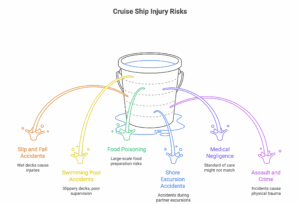Picture this: sun-drenched decks, turquoise waters, and the gentle sway of a luxury cruise ship. But what happens when paradise turns precarious? Cruise ship holidays, while often idyllic, can unfortunately lead to accidents and injuries. If you’ve experienced a cruise ship injury, it’s vital to understand your rights and how to protect them. Let’s dive in.
Common Causes of Cruise Ship Injuries
Cruise ships are like floating cities, and just like any city, accidents can happen. Some frequent causes of injury include:
- Slip and Fall Accidents: Wet decks, uneven surfaces, poorly lit stairwells, and sudden movements can all lead to slips, trips, and falls. These are arguably the most common type of cruise ship injury.
- Swimming Pool Accidents: From slippery pool decks to a lack of adequate supervision and improperly maintained equipment, swimming pools are often a source of accidents.
- Food Poisoning: Large-scale food preparation can sometimes lead to outbreaks of norovirus or other foodborne illnesses.
- Shore Excursion Accidents: Cruise lines often partner with local tour operators. Accidents during these excursions, such as bus crashes or adventure activity mishaps, can lead to serious injuries.
- Medical Negligence: While cruise ships typically have medical facilities, the standard of care might not always match what you’d expect on land. Misdiagnosis, delayed treatment, and medication errors can cause significant harm.
- Assault and Crime: While rarer, incidents of assault, theft, and other crimes can occur on cruise ships, resulting in physical and emotional trauma.

Establishing Liability in a Cruise Ship Injury Case
After a cruise ship injury, proving who is responsible is crucial. The key concept here is often negligence. This means the cruise line (or a third party) failed to exercise reasonable care, and that failure directly caused your injury.
For example, if a passenger slips on a spill that hasn’t been cleaned up for hours, despite crew members being aware of it, the cruise line could be considered negligent. Similarly, if a tour operator provides faulty equipment on a shore excursion leading to an accident, they could be liable.
The cruise line’s insurance coverage plays a significant role. They will usually have liability insurance to cover accidents and injuries that occur on board the ship or during shore excursions they manage. However, getting a fair settlement can be challenging, and that’s where legal expertise comes in.
What to Do Immediately After a Cruise Ship Injury
If you’re injured on a cruise ship, here’s what you should do:
- Seek Medical Attention: Prioritise your health and get immediate medical care. Document all medical treatments received on board.
- Report the Incident: Report the injury to the cruise line’s medical staff and security. Obtain a copy of the incident report.
- Gather Evidence: Take photos or videos of the accident scene, the hazard that caused the injury, and your injuries themselves. Collect contact information from any witnesses.
- Keep Records: Keep copies of all medical records, incident reports, receipts for expenses incurred as a result of the injury, and any communication with the cruise line.
- Don’t Delay: Be aware that cruise ticket contracts often contain short deadlines for reporting incidents and filing claims.

Navigating the Legal Process for Cruise Ship Injury Claims
The legal process for cruise ship injuries can be complex. Cruise ship injury cases are often governed by maritime law, which is a separate body of law that applies to incidents occurring on navigable waters. A crucial element is the ‘statute of limitations’ – the deadline for filing a lawsuit. This is usually one year from the date of the incident, but it’s vital to check your cruise ticket contract, as it might specify a different (shorter) period. Missing this deadline can completely bar your claim.
Cruise lines often require that lawsuits be filed in a specific jurisdiction, usually Miami, Florida, regardless of where you live. This is another important detail outlined in the cruise ticket contract.
Several successful cruise ship injury lawsuits highlight the possibilities when negligence is proven. For instance, a case where a passenger suffered severe food poisoning due to unsanitary conditions in the ship’s kitchen resulted in a substantial settlement. Another case involved a passenger who fell and broke their hip because of a poorly maintained staircase, leading to a successful claim against the cruise line.
Cruise Ship Ticket Contracts and Their Impact on Your Rights
Your cruise ticket is a legally binding contract. It contains important clauses that can significantly impact your rights if you’re injured. Pay close attention to these sections:
- Forum Selection Clause: As mentioned, this dictates where you can file a lawsuit.
- Time Limitation Clause: This specifies the deadline for filing a claim.
- Limitation of Liability Clause: This may attempt to limit the cruise line’s liability for certain types of injuries.
It’s essential to review this contract carefully, even though it might be filled with legal jargon.
Seeking Legal Representation for Your Cruise Ship Injury
Dealing with a cruise ship injury claim can be daunting. A solicitor specialising in maritime law and cruise ship injuries can guide you through the process, protect your rights, and help you pursue fair compensation. They can:
- Investigate the accident thoroughly.
- Gather evidence to support your claim.
- Negotiate with the cruise line’s insurance company.
- File a lawsuit if necessary and represent you in court.
Compensation can cover medical expenses, lost wages, pain and suffering, and emotional distress. Remember that mental and emotional distress claims arising from incidents such as witnessing a traumatic event or suffering from prolonged illness due to negligence are also valid and should be considered.
Cruise lines, just like any other company, have varying safety records. While official comparative data is limited due to privacy concerns and reporting regulations, seeking online reviews and reports can provide some insights into past incidents.
Don’t let an accident ruin your cruise holiday completely. Understanding your rights and seeking the right support can help you get back on your feet.




